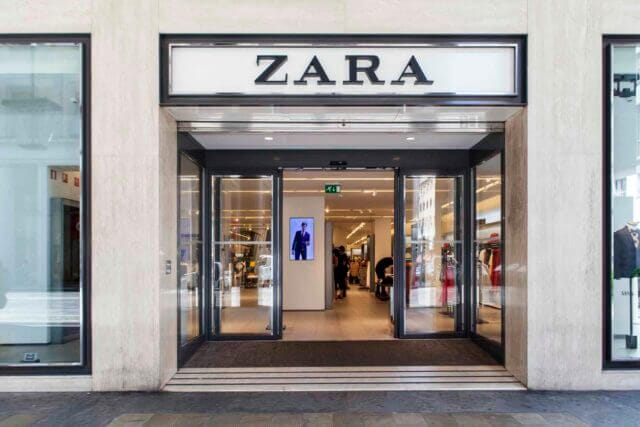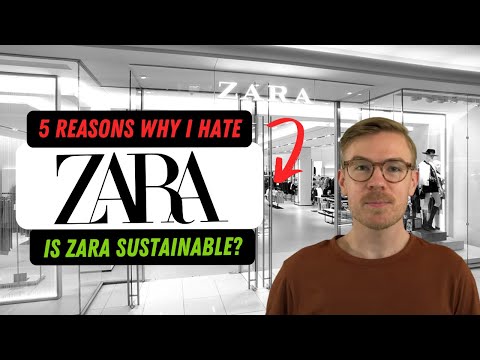
We’re back with #fiveweeksoffails–a series where we dig into some of the biggest names in fast fashion to help you sort progress from BS.
Following our extensive sustainable brand criteria, each brand will receive scores for transparency, maker well-being, and environmental sustainability. We’ll also rate them for DEI and our principles. In order for a brand to be considered sustainable, they need to score at least 50 points.
We’ll go over the good, the bad, and where there is room for improvement. The brand we are holding to the fire this week? Zara.
Zara is a fast fashion pioneer. New inventory comes in so quickly that a shopper is likely to get a completely new shopping experience each time they walk into a store.
Recently, Zara has been making an effort to boost its sustainability image with the launch of its Join Life movement. This launch includes sustainability commitments, ethical goals, and, of course, a product line. But has this recent effort been enough to make them a sustainable brand?

THE RESULTS: Is Zara Ethical and Sustainable?
Zara falls far behind truly sustainable brands. Their Join Life program isn’t doing enough to make meaningful change. They’re also still promoting the mass consumerism that feeds into fast fashion, and is inherently unsustainable.
Let’s dig into the results.
Transparency Rating: 2/14
For transparency, Zara scored 14%. Not great.
The good: Zara’s parent company, Inditex, shares reports related to its supply chain traceability and its audits. They mandate all subcontractors receive safety audits and participate in a continual review process that allows for contracts to be terminated if a factory consistently fails to make improvements.
They also have, “collaboratively design[ed] specific programs on the subjects of health and safety, worker participation, training and awareness, a living wage, responsible purchasing practices, migrant protection, and women’s empowerment.”
The bad: Almost all of the information on Zara’s site links to their parent company: Inditex. While that isn’t inherently a bad thing, it can be difficult to find information specific to Zara on the Inditex website.
The company doesn’t provide a detailed factory list and the results of their audits are not publicly available. There is no factory list, even for their tier 1 suppliers. ASOS shares their tier 1-3 suppliers, meanwhile Zara shares nothing.
They also don’t share how much traceability they have in their supply chain. Is it 50%? 100%?
Maker Well-being Rating: 15/33
Zara received a 15/33 for maker well-being. While they have begun taking steps to improve the working conditions of their workers, with their size and profitability, there’s really no excuse for them to be so far behind other brands.
Zara has a solid code of conduct. Their audits ensure that the code is enforced and allow termination if companies can’t live up to their standard. Additionally, there is some evidence that Zara is working on collaborative well-being and education initiatives.
They offer no evidence that their clothing makers earn living wages, what the wages are, or what percentage of their makers earn fair wages.
When it comes to unions and collective bargaining Zara earns some points. They do offer good programs to collect worker feedback and make changes. However, they don’t share the percentage of their factories with such programs, and it’s likely under 50%.
As much as we’d hoped that Zara would’ve implemented well-being initiatives at their factories, their website suggests otherwise. Less than half of their factories implement these programs, which means that half of their factory employees don’t receive the support they need. Not cool.
At Eco-Stylist, we don’t applaud half-assed effort. Put in the effort, Zara, and maybe you’ll earn an A.
Environmental Sustainability Rating: 20/49

Zara scored below 50% for environmental sustainability.
They have recently publicized a list of environmental commitments. These goals span to 2030 and include everything from water conservation to reducing waste in landfills. They’ve also worked to ban some harmful chemicals in production.
The main issue with Zara’s environmental policy is lack of transparency. They fail to disclose the number of resources that go into their production. This makes it difficult to determine how impactful their sustainability goals can truly be.
They also just don’t quantify their current progress very often. You’ll find tons of goals for 2030, but few metrics that share where they are today.
Zara Sustainability – Raw Materials Rating
Within the sustainability section brands can earn points for their raw materials. Zara didn’t earn any.
The good: Zara has a policy for animal protection.
The bad: to get the points in this section, they need to be producing over 50% of their material sustainably and in ways that protect the human rights of producers. The company simply isn’t there.
While Zara offers a plan and future goals for sustainably sourced raw materials, it’s clear that they’re still below 50%. And it’s unclear when they’ll reach that target.
DEI Rating: 1/4
This is a difficult category to score points in. Even many of our most sustainable brands struggle to get full credit.
That being said, Zara earned 1 point for having a detailed DEI policy. They did not earn points for having a diverse leadership team as that info wasn’t available anywhere on their site.
Our Principles
When it comes to our principles Zara’s score took a hit. First, because they are a fast fashion brand, and therefore part of the driving force of un-sustainability in fashion, this earned them -25.
Second, we look for brands that inspire us and that we trust. In fact, all of our Certified brands meet these principles, while also being 0% fast fashion.
When it comes to Zara, we didn’t deduct points for trust, which is generous considering a history of greenwashing, but we deducted points for inspiration as they are very far from leading anything when it comes to sustainable fashion. So -10 points there.
How Sustainable is Zara? Overall Score: 3/100
Zara’s current business practices fall abysmally short, scoring them a measly 3 points. Come on, Zara–I was rooting for you! We were all rooting for you! Let’s hope their sustainability goals improve their score in the future… for now, they receive a failing grade from us.
Want to see other brands we’ve put to the test? Check out our first brand in #fiveweeksoffails: Express.
Is Zara Join Life Sustainable or Greenwashing?

Zara claims that as of 2022, 50% of their entire collection meets the Join Life standards. It sounds great, but what does this actually mean?
First off, even with Join Life, they still aren’t paying their clothing makers living wages or providing strong evidence via certifications (or other means) that they have an ethical supply chain. Second, while their use of sustainable fabrics is improving over time, it’s hardly ground breaking.
At the end of the day, Zara is still a fast fashion brand, promoting fashion overconsumption and the belief that clothes are disposable. They try hard to create FOMO so consumers will keep coming back to buy clothes they don’t need. We recommend avoiding Zara.
Is Zara Fast Fashion?
As noted, not only is Zara a fast fashion brand but they are one of the inventors of the business model. Together with H&M they really helped create the fast fashion business model, which has made the whole fashion industry less sustainable overall.
Learn more about the problems with fast fashion here.
More About Zara’s Environmental Impact
Want to dig even deeper into Zara’s ethics and sustainability? Check out our video:

Sustainable and Ethical Alternatives to Zara
For the best options check out our guide: 14 Ethical Alternatives to Zara!
And for a few more, the team at Eco-Stylist put together our top 3 favorite alternatives to Zara. Click each one to see their brand rating or to shop.
Looking for more Ethical Brands?
For more Zara swaps check out our ethical brand guide for 100+ good brands.

*Article updated 1/26/24.

Lily Rosen Marvin studies English and Creative Writing at the University of Iowa. When she’s not writing about sustainable fashion, Lily can be found hiking, reading outside, or binge-watching 30 Rock.











3 thoughts on “Zara Sustainability Rating | How Sustainable is Zara? Are They Fast Fashion?”
There is honestly a lot of room for Zara to improve their sustainability, but I don’t really think that they are focusing on it. Instead of giving importance to these areas, Zara chooses to focus on the business itself rather than the factors of sustainability which is mentioned in this article, which is honestly quite disappointing because they are a well-known product in south-east Asian countries.
how is it possible to have such information? I mean, how can I see if zara is really a sustainable brand or not?
I would like to write my master thesis on this topic
A good article and definitely food for thought on their environmental and ethical behaviours.
Does the fact that they have very little waste, due to smaller volume production, give them a tick vs other retailers? Their used clothing sells very quickly on Vinted.